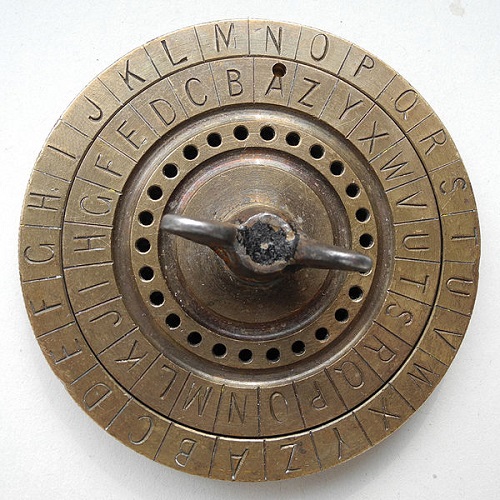Hi folks, here is your Python Tkinter GUI Programming sample application to kick-start your Tkinter Skills.
The Caesar Cipher
The Caesar Cipher was an early encryption method apparently actually used by the Emperor Julius Caesar. It is based on the idea of shifting the letters in a message by a certain number of positions along the alphabet, and looping back the the start if the shift moves a letter beyond the end of the alphabet.
The code below uses the Python Tkinter library, which is very popular for building graphical user interfaces (GUIs). This basic application contains many of the elements you will need in your own applications, and provides an excellent starting point for learning Python Tkinter GUI programming.
You can download a .zip file containing the code for this app here: Caesar Cipher Tkinter App.
import tkinter as tk
FONT = ("calbri", 20, "bold")
class CaesarCipherGUI:
def __init__(self, master):
master.title("Caesar Cipher GUI")
self.plaintext = tk.StringVar(master, value="")
self.ciphertext = tk.StringVar(master, value="")
self.key = tk.IntVar(master)
# Plaintext controls
self.plain_label = tk.Label(master, text="Plaintext", fg="green", font=FONT).grid(row=0, column=0)
self.plain_entry = tk.Entry(master,
textvariable=self.plaintext, width=50, font=FONT)
self.plain_entry.grid(row=0, column=1, padx=20)
self.encrypt_button = tk.Button(master, text="Encrypt",
command=lambda: self.encrypt_callback(), font=FONT).grid(row=0, column=2)
self.plain_clear = tk.Button(master, text="Clear",
command=lambda: self.clear('plain'), font=FONT).grid(row=0, column=3)
# Key controls
self.key_label = tk.Label(master, text="Key", font=FONT).grid(row=1, column=0)
self.key_entry = tk.Entry(master, textvariable=self.key, width=10, font=FONT).grid(row=1, column=1,
sticky=tk.W, padx=20)
# Ciphertext controls
self.cipher_label = tk.Label(master, text="Ciphertext", fg="red", font=FONT).grid(row=2, column=0)
self.cipher_entry = tk.Entry(master,
textvariable=self.ciphertext, width=50, font=FONT)
self.cipher_entry.grid(row=2, column=1, padx=20)
self.decrypt_button = tk.Button(master, text="Decrypt",
command=lambda: self.decrypt_callback(), font=FONT).grid(row=2, column=2)
self.cipher_clear = tk.Button(master, text="Clear",
command=lambda: self.clear('cipher'), font=FONT).grid(row=2, column=3)
def clear(self, str_val):
if str_val == 'cipher':
self.cipher_entry.delete(0, 'end')
elif str_val == 'plain':
self.plain_entry.delete(0, 'end')
def get_key(self):
try:
key_val = self.key.get()
return key_val
except tk.TclError:
pass
def encrypt_callback(self):
key = self.get_key()
ciphertext = encrypt(self.plain_entry.get(), key)
self.cipher_entry.delete(0, tk.END)
self.cipher_entry.insert(0, ciphertext)
def decrypt_callback(self):
key = self.get_key()
plaintext = decrypt(self.cipher_entry.get(), key)
self.plain_entry.delete(0, tk.END)
self.plain_entry.insert(0, plaintext)
def encrypt(plaintext, key):
ciphertext = ""
for char in plaintext.upper():
if char.isalpha():
ciphertext += chr((ord(char) + key - 65) % 26 + 65)
else:
ciphertext += char
return ciphertext
def decrypt(ciphertext, key):
plaintext = ""
for char in ciphertext.upper():
if char.isalpha():
plaintext += chr((ord(char) - key - 65) % 26 + 65)
else:
plaintext += char
return plaintext
if __name__ == "__main__":
root = tk.Tk()
caesar = CaesarCipherGUI(root)
root.mainloop()
